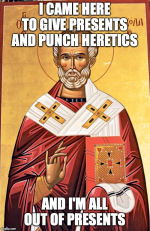I am going to post below some of the Watchtower's thoughts on Arius, which I found to be interesting:
Because the fourth-century dissident theologian Arius stated the Biblical truth that “the Son is not unbegotten,” and Jehovah’s Witnesses accept that truth,
The New Encyclopædia Britannica states: “The Christology of Jehovah’s Witnesses, also, is a form of Arianism.” First, it must be stated that Jehovah’s Witnesses do not have a particular “Christology,” defined as “the theological interpretation of the person and work of Christ.” They share the view of the Christian layman who is recorded as having bluntly told the wrangling theologians assembled in Nicaea in 325 C.E.: ‘Christ did not teach us dialectics, art, or vain subtleties, but simple-mindedness, which is preserved by faith and good works.’ Apparently this man had suffered for his faith in Christ, even as many of Jehovah’s Witnesses have. Like him, they have no faith in theological philosophy. They accept with simplicity what the Bible states about God, Christ and the holy spirit, and they are willing to suffer for their simple faith and prove it by good works.
Secondly, Jehovah’s Witnesses cannot be accused of Arianism, inasmuch as they disagree with Arius’ views in many respects. For example, Arius denied that the Son could really know the Father. The Bible teaches that the Son ‘fully knows’ the Father and that the Son is “the one that has explained him.” (
Matthew 11:27; John 1:14, 18) Arius claimed that the Word became God’s Son “by adoption” because of his virtue or moral integrity. The Bible says that he was created by Jehovah as his “only-begotten son.” (
John 1:14; 3:16; Hebrews 1:2; Revelation 3:14) Arius taught that Christians could hope to become equal to Christ, whereas the Bible states that God gave him “the name that is above every other name.” (
Philippians 2:9-11) Far from being modern-day Arians, Jehovah’s Witnesses believe what the Bible says.
Although Arius did not accept Athanasius’ theory that the holy spirit was of the same substance as the Father, he did consider the spirit to be a person. This provides further proof that Jehovah’s Witnesses are not Arians, for they share the Biblical view of the early Christians, namely, that the holy spirit is God’s active force, which he uses in many ways to accomplish his will. (
Acts 5:32) True, there are passages in the Bible where the spirit is personified. But this proves nothing. Even
A Catholic Dictionary admits: “Most of these places furnish no cogent proof of personality. . . . We must not forget that the N[ew] T[estament] personifies mere attributes such as love (
1 Cor. xiii. 4), and sin (
Rom. vii. 11), nay, even abstract and lifeless things, such as the law (
Rom. iii. 19), the water and the blood (
1Jo 5:8 1 Jn. v. 8).” On the other hand, the Bible speaks of the spirit as being ‘poured out,’ and of people being “filled with holy spirit,” receiving the spirit as a “free gift,” and being ‘baptized in holy spirit,’ none of which would make sense if the holy spirit were a person.
*—
Acts 2:4, 17, 38; 4:31; John 1:33.
1984, September 1
Athough there are certainly differences between Arian, and Witness theology, perhaps the watchtower is a litte too insistent in disasscociation with Arian christology and seems to be rarely mentioned in Watchtower pubications. It is a lot closer to the truth than trinitarianism that is for sure.


